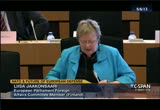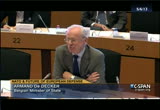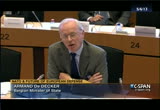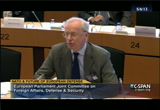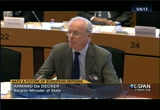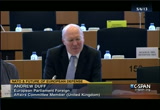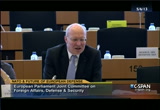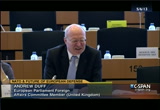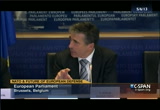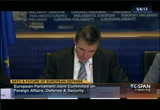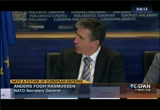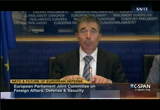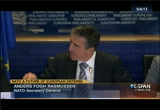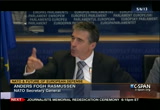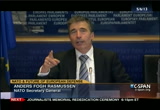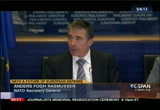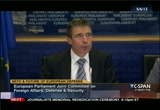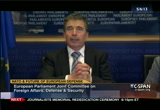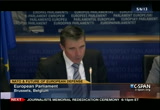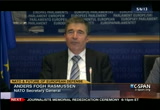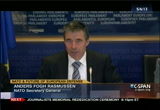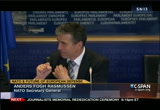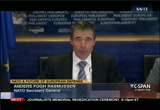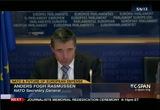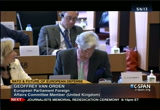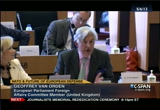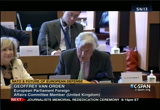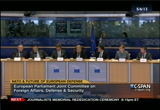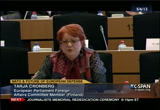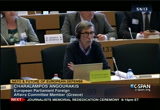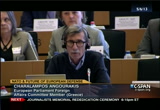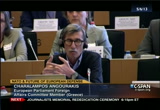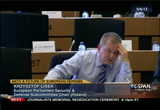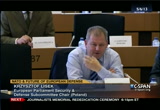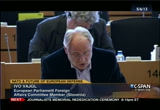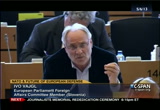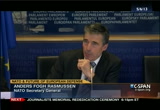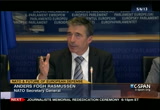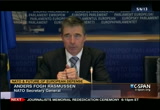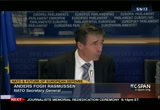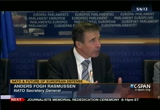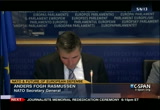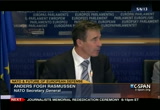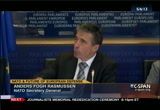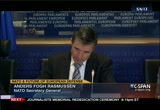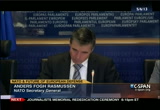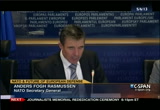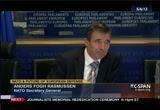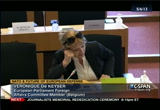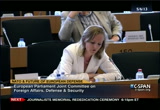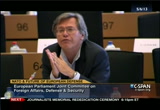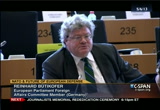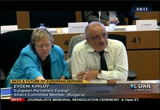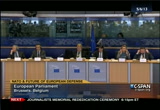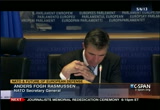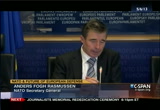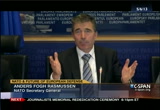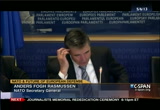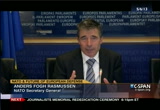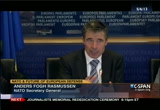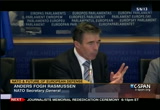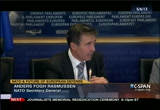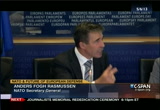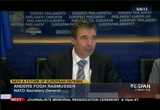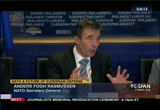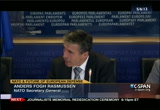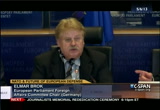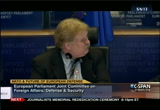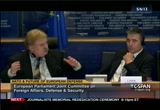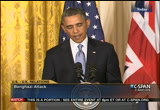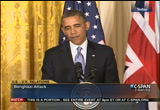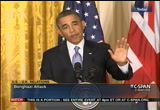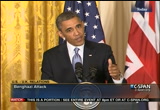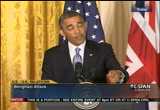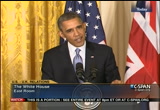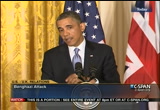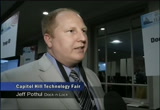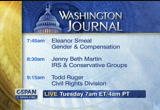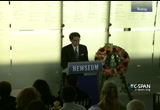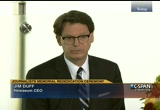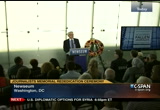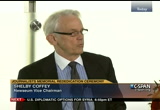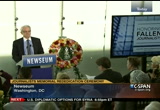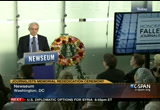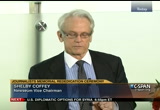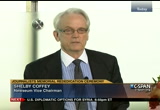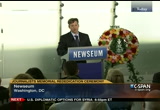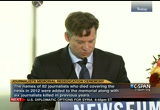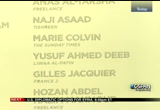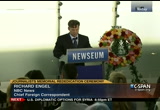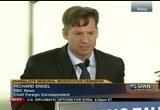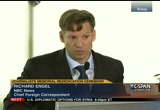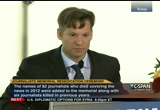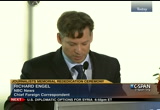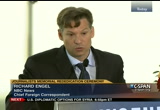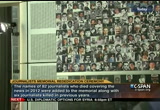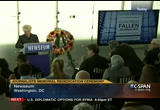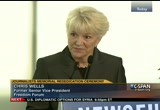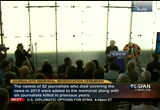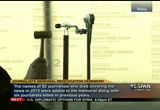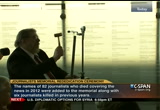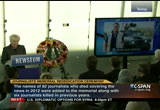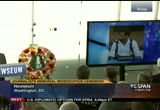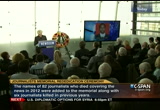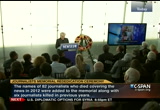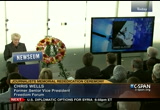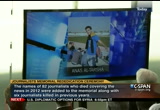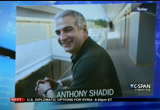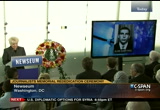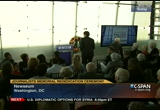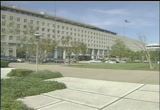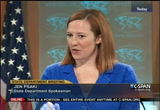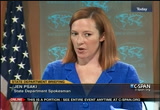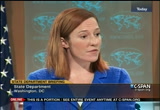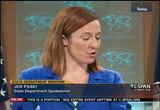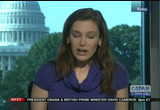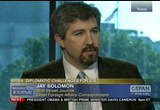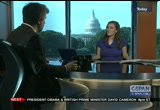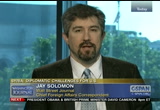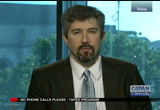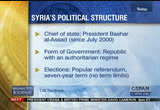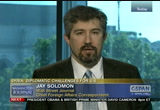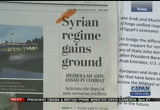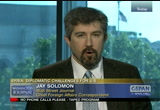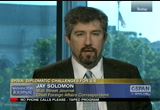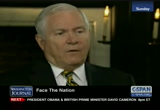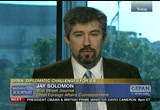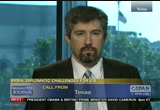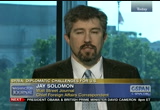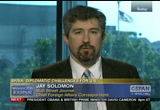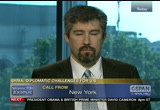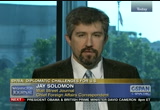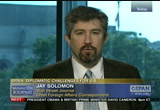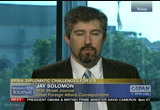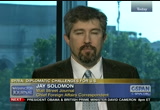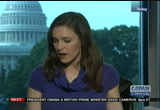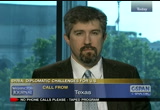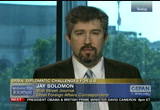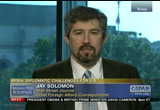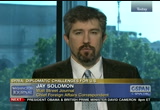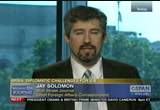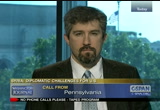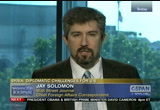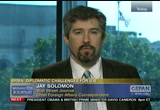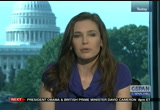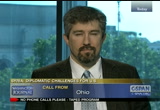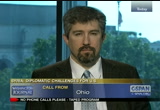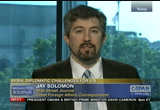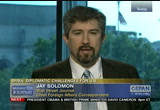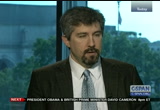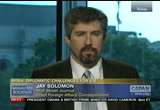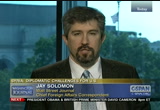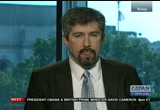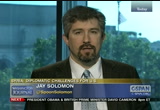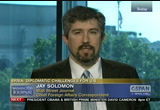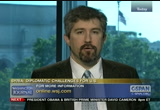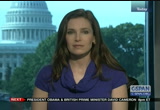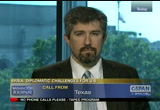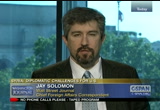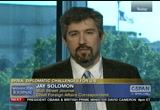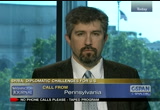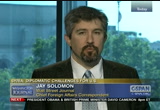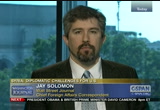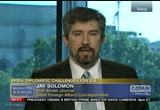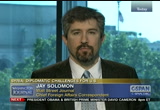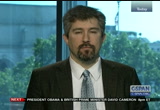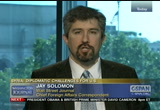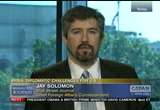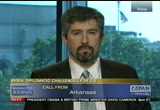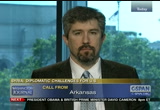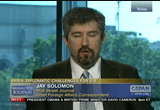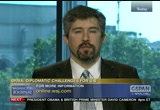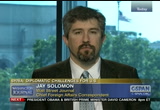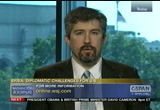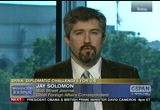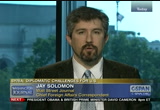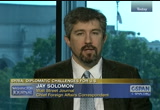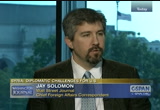tv Public Affairs CSPAN May 13, 2013 5:00pm-8:01pm EDT
5:00 pm
now obsolete? in this crisis, i think that there might be more enthusiasm for pooling and sharing. but my question is, can you tell me, is there any research into this? is it possible to do research into how much public money is wasted in this way? >> thank you, chair. i would like to thank the nato secretary-general for setting out his position clearly. i would like to thank the secretary general for his comments, brief sustained comments that were very powerful words. he spoke of the need for europe to make a greater investment in
5:01 pm
its own security. it is true that written sharing is -- that burden-sharing is a two-way street in connection with nato post up this is -- with nato. this is an age old question that predates the fall of the berlin wall. many years later, when i note is that, despite it all, nothing major has changed. as things stand, the u.s. is clearly setting its sights, its strategic sites on the pacific. i had just come back from india. i could sum up political sentiment in india on europe by saying the following -- india believes in the u.s., believes in major states, but not in the european union. i am summarizing, simplify, but that is more or less the
5:02 pm
message. there are threats facing us, surrounding us. they are > every even if of the opinion is not aware of this. look at what is happening in syria. of course, we do not wish to see a military intervention there, but it might be necessary if certain forces lay their hands on chemical weapons. so it would be interesting to hear your assessment of the situation. now, head of the eu summit on security, i would love to hear from you on behalf of nato -- would you call on your to develop european defense policy? military resources and budgets are dwindling. the uk and france estimate
5:03 pm
serious disastrous choices if we continue to operate under national flights only. wet ha crediblero. the time has come to pool our resources, particularly in light of the dwindling budget. but this is not the discourse we here in national parliament when discussing the economic crisis. the fact is that this is a vital move. will nato, therefore, clearly adopt such a position? that would be a first. nato has supported countries doing more within nato. will nato call for integration of the military resources of the new member states? >> thank you. >> good afternoon.
5:04 pm
two points -- the first, we all appreciate that an impediment to stronger relations between nato and the eu is always the turkey- cyprus problem. do you agree with me that it would be therefore prudent to ask the turkish prime minister [indiscernible] to be at the september meeting of the european council?
5:05 pm
i think if he is asked, it w be his first chance to speo his peers since 2004. that is a long time. secondly, following the trip to north would -- to northwood, could you say something about nato's approach to the future of the atalanta program -- they adalanta program against the somalian pirates? if we withdraw from the operations next year, the pirates will return.
5:06 pm
5:07 pm
>> thank you very much indeed for lots of very relevant questions. first, thank you for your kind words. you asked me how we could possibly better coordinate between nato and the european union. mr. click asked questions in the same direction. i think we have three areas in which we need very close cooperation and coordination between nato and the european union. first is operations. we operate together in afghanistan, in kosovo, and i also have to say, despite all of the overall political problems, challenges in our cooperion,
5:08 pm
we managed coordinate smoothly in theater. so leo: isaf work efficiently together enough against a -- in afghanistan they work together in a very efficient manner in kosovo to love each other. i think, in daily life, we managed to get along. secondly, we need close coronation when it comes to development of capabilities. that leads me to answer the questions about smart defense and pooling and sharing that several of you mentioned. it was mentioned smart defense pooling and sharing. also, mr. click mentioned that. we have to ensure that we do not
5:09 pm
pursue parallel programs, but acly complement ea o and ensure efficient use of taxpayers money. no unproductive competition, no duplication of work. and i could mention an excellent example of how we have an impact on what i would call a productive division of labor. at the chicago summit laster, year in nato allies committed themselves -- european-nato allies committed themselves. overall, we have a lot of capacity within nato when it comes to air-to-air. but u.s. capabilities -- what we need is a european investment in that capability. so european allies made that commitment in chicago.
5:10 pm
that is an excellent example of how we can divide labor. no reason for nato to embark on that. that is for the european defense agency. thirdly, we need more cooperation and consultation and coordination when it comes to politics. here, we really have an absurd situation. in informal meetings, we are only allowed to discuss one issue, one issue, bosnia. because the eu conducts an operation in bosnia within the berlin framework as it is called. i will not go into the technical details. the bottom line is that this is the only issue that we are
5:11 pm
allowe d and those meetings take place with eu at 26, that is without secure participation. and for the same reason, the eu is reluctant to have two many of those meetings with only 26 out of 27 members. if we suggest to discuss other issues of relevance, kosovo, for instance, then we can only do it in an -- in informal meetings. that is where we are. that leads me to the conclusion that, unless we find a solution to the cyprus problem, we will continue to have this absurd situation. so here is really an issue or we should move forward. i have previously tabled some pregnant proposals as to how we can move forward. but i have to realize that to find the lyrical solution, we
5:12 pm
need the partners in cyprus to find each other. they have economic challenges. they have renewed -- they have resources they could exploit once they reunify the island. here, i think, the european union could play a role. i think the european union has some level to facilitate in the resolution to the problem. i was also asked about nato post-2014. are we really looking for new tasks? do we try to invent new activities just to ensure that nato continues to be relevant? no way. there is no need to invent new things. in our hands, we have a full plate.
5:13 pm
our hands are full. so nato post-2014 will be a nato that is prepared to take action if needed. and one way to do that is to make sure that the ability we have developed to work and operate together in a gena stand, that ability will be maintained and further developed in the coming years. we call it the connected forces initiative because it is about joint exercises, training, education. so that what we learned in afghanistan will be maintained even if we draw down in afghanistan. and believe me, there will be new tasks. we stand ready. we are prepared for the unexpected. if you had asked me when i took
5:14 pm
office as secretary general in honest 2009, can you imagine nato in libya? i would not only probably but definitely have answered no. but nevertheless, it showed up as a task that we had to handle. and this is my point. we need to stand ready for the unexpected. that is nato post-2014. i have seen the press reports and i have noted that no such activity has taken place in areas of relevance for our deployments of patriot missiles in turkey. but obviously, the situation in syria remains a matter of concern.
5:15 pm
we are concerned about the disastrous humanitarian situation. we are concerned about the risk of's lover in the region. we are concerned about the possible use of chemical weapons. -- we are concerned about the political risk in the region. we are concerned about a possible spillover in the region. we are concerned about the possible use of chemical weapons. the only way forward is political solutions. mr. click asked me whether the so-called u.s. could it -- u.s. pivot to asia will weaken the u.s. atlantic relationship. that would very much depend on the europeans. i think it is in our interest that the u.s. rebalance its interests and focus a bit more
5:16 pm
on the asia-pacific region, taking into account the rising powers in that region. but if we are to ensure that the americans still find europe relevant as a partner, the europeans must also invest in that transatlantic relationship politically, economically and militarily. that is my point. mrs. jan sorry -- she asked pretty much the same question. with this u.s. move to asia downgrade nato -- would this u.s. move to asia downgrade nato? not in itself. if the europeans don't invest in the transatlantic relationship, it may weekend that point.
5:17 pm
actually, we have seen a strong u.s. commitment to european security. for instance, the u.s. contribution to a nato missile defense system, that is a u.s. commitment to addressing emerging security challenges. instead of having a lot of stationary forces in cold war structures in europe, the u.s. is now engaged in a modern way, in a way that actually addresses the threats of our time. in that respect, you also asked me about obsolete infrastructure. do we have any research that indicates how much money is wasted on obsolete infrastructure and old-fashioned structures in general.
5:18 pm
i am not aware of such research. but we are very much focused on reforming our military forces in the direction of more deployability will stop so less strategy structures, more mobility, more ability -- deployability. so less strategy structures, more mobility, more ability. i was asked quite directly would you, as nato, recommend the european union to develop a european defense policy? as the secretary general nato, i will not interfere with eu policies.
5:19 pm
but i think you have heard my words today. i do believe that we need a strengthened european defense. i don't see any contradiction between a strong nato and a strong european defense cooperation. on the contrary, that is a pillar within nato. as a strengthened european defense policy is dependent on capabilities. now i speak very openly and frankly. not new institutions. then it could contribute in a valuable way to strengthening our overall security. otherwise, it will just be hot air, as i said. in that respect, i am in favor of it, but i don't interfere
5:20 pm
with it. just to conclude on that point, very often, we are discussing whether -- i know, in some political rooms you also discuss whether we should actually have a common european defense. now, to speak realistically, i don't think we will see it in my lifetime. when it comes to -- and i intend to live for a long time -- [laughter] i say this because, as secretary-general of nato, i have learned how much individual nations protect their integrity and their national sovereignty when it comes to defense and security policy. that is really untouchable. so i don't think that will materialize. but i do believe that, in the coming years, we will see nations cooperate much more across board is -- across
5:21 pm
borders because they need it. they needed. you will see multilateral -- they need it. you will see multilateral ece bottom line will be that nation's are not -- that nations are not able to acquire expensive military clement on their own. even the bigger european nations will need -- expensive military equipment on their own. even the bigger european nations will need to work collectively. i was asked whether it would be a good idea to invite ambassador [indiscernible] two invite -- i would refrain on making european decisions on who they would like to participate in european council meetings.
5:22 pm
now, the lesson learned is that through a close international coronation, the eu, nato and individual players -- international coordination, the eu, nato and individual players we can accomplish a lot. based on these lessons learned, it would be worthwhile deploying maritime assets in other parts of the world in an international effort to ensure free and open sea lanes because piracy seems to be able to emerge in other parts of the world. thank you. >> thank you very much. i would like to give the floor to someone who would like to comment on your remarks. [laughter]
5:23 pm
>> thank you very much, chairman. i am delighted to see you here, secretary-general. it is always a great pleasure to have a width of reality -- a whiff of reality in this institution. you made remarks that nato has no need to invent things after 2014. of course, the european union wants to invent things all the time. it scours the world looking for a role, trying to find opportunities to put his flag down in order to justify european defense policy. it seems to me that the question we have to ask is how to strengthen the capacity of democracies? how shall we strengthen their ability to act in this world? not how do we justify the role for the european union?
5:24 pm
secretary-general, you are in a very difficult position. you are a diplomat come better politician. you're mainly a diplomat. you have to speak in a way that not offend any of your 28 member states. the fact is, in this particular case, we are having a different conversation. it is not about strengthening defense capabilities. it is about finding a role for the european union to act. don't you think that, in this time of scarce defense resources, it would make far more sense, rather than have the european union creating parallel structures and institutions, if it was to concentrate on european efforts within nato? because that is really where real certainty will happen.
5:25 pm
of course, all of this duplication of effort is compounded by the fact that we end up with basically the same member states talking to one another in the same city. my concern, i suppose, the way things are going at the moment, first of all, we don't have a truthful conversation because the conversation here is about roles for the european union. when in reality, i believe what you want to say is please stop playing politics, stop building new institutions and structures and things and create more capability. that is what we need. and you won't do it through the european union because their objective is something entirely different. but aren't you worried about an it -- an eventual buffer kaisha and of that we will end up with a binary alliance. -- eventual bifurcation of that and we will end up with a binary alliance.
5:26 pm
that is the objective, that they have in mind. it strikes me that that is a very dangerous traction to go in. -- very dangerous direction to go in. secretary-general, what i would ask you to do is encourage the european countries to put their effort into the alliance and to stop all of this duplication and stop dressing it up as if, somehow or other, they are adding capability when they actually are not. >> i have seen mr. rasmussen in many situations. but i have never seen him as a diplomat. [laughter] mrs. klovac.
5:27 pm
>> i would like to focus on russia and the missile defense. any savant, there was a great friendship between russia and nato and one would work together on missile defense will stop since then, there have been a lot of problems in missile defense. i would like to hear your assessment now that the americans have postponed, may be canceled, the base for missile defense. does it open up new possibilities with russia on missile defense? and what is the situation in the nato-russia council? i am the chair of the year he and -- of the iran situation. what would you say is nato's role in this case?
5:28 pm
thank you. >> first of all, may i say that mr. rasmussen is constantly up feeling -- constantly appealing to france and other people across europe, not as a matter of credible -- of principle. what is going on now is that new systems are being used, new military technology such as drums, which actually kick people -- such as drones, which actually kill people. they have killed many people in afghanistan.
5:29 pm
when you talk about strengthening the european element of nato, it is quite simple for anyone who looks at the state of the facts. nato wants to be able to decide which crisis it will intervene in and anywhere it does not fill necessary leave it up to the europeans. what do you think about supplying airplanes in flight? the talk of cooperation, there is no real cooperation because the crisis of interest among nato imperialist powers have obviously -- and obviously the united states will use its
5:30 pm
leverage in nato. nothing can change in nato unless washington gives the nod. you can only look at the you need to only look at the founding charter of nato. and it is also clear that if one of the members applies the if france and in the united states would say, i don't intervene, but the europeans do it. we don't have any money. any reference is made to taxpayer funds. 20 years following the war in yugoslavia, kosovo is still occupied. when will the occupation of cause of a come to an end?
5:31 pm
5:32 pm
on that defense committee that 300 million euro could be saved by pooling and sharing. whereas the cuts made by member are 30 billion euro. in other words, 100 times more. being done by nato to try to stop these myths of cuts. -- to stop these cuts? there are skeptics. how you intend to persuade the people of europe that the missile defense is in the defense of europe and not just the interest of the united states. to thank you for your words of hope regarding georgia.
5:33 pm
the political parties and people in georgia are very much in favor of nato membership. persuade major european governments to drop their reservations to nato membership? >> thank you, inspector general. there are a lot of factors that have bearing on our security that are unpredictable. we need to reduce the number of possible factors in relation to what we have today. that leads me to my question.
5:34 pm
do you believe that some scope betterdination -- coordination between nato and european union might be, for bringinganticipating forward the kind of processes that have been harder to foresee? an unexpected events, we have seen that nato has not been terribly successful. or to be blunt, it has actually failed. i believe we need to stretch our cooperation, not just by expanding our logistic capacity, but also our ability to apply some thought to our missions. happeningsue, what is with macedonia and its position
5:35 pm
in nato? you are well aware of why raising this. about theg international court. clearly, this is a region of a country where the image of nato is still extremely significant. thank you. >> thank you very much. i'm notet me tell you an institutionalized. i do not care who exactly what -- who does exactly what. i care about is getting done. identified critical shortfalls when it comes to military capabilities. we have learned lessons from our operations, notably in afghanistan and libya.
5:36 pm
we have learned a lot of lessons. and we have identified critical shortfalls. and my goal is to fill those gaps, whether that is within a nato framework or in the you -- or any you framework and i don't care. but 21 members of both organizations. and obviously, we owe it to our taxpayers to make sure that the work we do is done efficiently. we have one set of taxpayers. we have one set of military capabilities. we need more investment in transport capability. we have a lot of soldiers in europe, but we cannot move them. about it.riefly we need air-to-air fueling. we learned that with al-liby operation. the libya operation. we need betterapacity when it
5:37 pm
to surveillance, reconnaissance, and to speak in very concrete terms about that, that is, to invest in drones withcan be used together such information and guide our military and political decisions. these are not critical shortfalls. mentioned, in the nato summit in chicago last year, european allies committed themselves to air-to-air filling capacity. capacity.ng if they want to do that through a nato entity, why not? i don't care about institutions. i care about the work to be done.
5:38 pm
that thehy i do agree most important thing to be done at the european council in december would be to invest a sufficient amount of money and critically needed military capacities. that would be the most important decision to take. asked me whether iran, no.isitors in i have never said that. nato is not engaged in iran. we support a diplomatic solutions.
5:39 pm
the changee whether of the so-called face effective approach could also facilitate a closer cooperation with russia on misfile the fence. defense.e that is important question. my answer would be, yes, i think it should, because the russian concerns so far have been primarily in related to the false face. -- the fourth phase. and now face four has actually been erased. if there is a political will in moscow, to actually cooperate, i think that could pave the way as to how natot and russia could cooperate on missile defense. let me said th
5:40 pm
that,nd -- having said the fact that phase four has does not change population inhe european nato nations. they will be covered by the missile defense system. because the first three phases will be implemented as planned. and that will cover all in the european nato nations. and you asked me when the occupation of gaza go well and koscvooste vote -- of
5:41 pm
will end. the people of the region do not consider it an occupation. when they recently concluded the agreements, those parties requested nato tuesday and guaranteed peace and stability in help -- and help in implementing the agreement. that is not an occupation. of course, i am pleased to see that nato is considered such an impartial guarantor of peace and civility, and we will stay as long as necessary. we operate on the basis of the un mandate and we have an obligation to implement the u.n. .andate to ensure free movement you asked me about afghanistan.
5:42 pm
there's a clear road map that by the end of 2014, the i staff wilion will come to an end. complete our mission, but we will stay after 2014 with a non-combat mission, a training mission to help the afghan security forces. whether we do anything to stop cuts in defense budgets. as you know, it is a national decision. we have a benchmark, according to which the nato allies have stated that those allies that have spent more than 2%, 2% or more on defense, commit theselves to stay above
5:43 pm
commitment and those who are below the 2% benchmark will try to work to reach it. it is not a legal requirement. it is a political obligation. whenever i visit capitals, and soon i will visit warsaw, i will repeat that message. and actually, i can tell you that i have had a political dialogue with government, but also with parliamentarians and said -- and some capen matters. -- and some in the cabinet. i can mention a conversation in which the main political parties have reached a broad agreement according to which they will gradually move toward the 2%. why for nagus secretary is also important to engage directly with parliamentarians.
5:44 pm
aboute this is very much defense budgets and financial and fiscal policy. if you were to ask me about missile defense, how we can convince people bad -- that it is also in the europeans' interest, it is quite clear we are faced with a real missile threat. more than 30 countries in the world have missile technologies are acquiring such missile technologies with a range of that they can hit targets in europe. it is clearly in europe's interest to develop an effective protection against bad real missile threat. -- against that real missile threat. finally in georgia, the decision that we took in bucharest in 2008 at the nato summit still stands. we stated georgia will become a
5:45 pm
member nation, of course, provided a finish the necessary criteria. we have established a commission and within that commission will work with george gai to move toward -- with the georgia move forward in the process with to one daygia be able to join the alliance. we are not there yet. there's a lot of work ahead. but i am pleased that the government in georgia as reaffirmed nato aspirations. for georgia to demonstrate that georgia fills the necessary criteria -- fulfills the necessary criteria. finally, mr. bartlett asked me about future enlargements. with --engaged at tvro
5:46 pm
engage activity with scorpio. we made the decision in proceedt that we will as soon as a satisfactory name to the found. they know that. perspective, we have done all we can. we are ready start negotiations immediately when a solution to the naming issue has been found. i call on all parties involved to do their utmost to find a solution to that name issue. to my mind, it is not impossible. it is within reach if it is there good political will. >> i have originally four names on my list, or three names on my
5:47 pm
list. it has diminished. if everyone keeps his part for one minute, perhaps we can make it. vierra nate, your the first to try that. thank you, chairman. just one question for you, mr. rasmussen. review n/a doh -- were you and involved in the bombings? the to coordinate that effort? december 7, 2013, natarus signed a cooperation agreement with israel, a bilateral agreement. and there have lines at the time to the fact that israel was
5:48 pm
becoming a defacto member of nato. strengthen the presence of military planning between nato and israel for the purpose of any future -- future action in the middle east. it is hard to believe there has been no coordination. analyze theiryou actions? >> you have talked about the need for leadership in a changing world. the need for capacity without which political leadership is quite empty. i want to ask about the capacity in the so-called cyber domain, or your relation to technology and defense. in the united states, it has been established that a defensive capacity is legitimized and necessary. i have read with great interest the manual.
5:49 pm
can you tell me what nato is planning with regard to cyber security and how will you secure the freedom and make sure that access to technology does not become a zero sum game? with regardquestion to syria, i followed the the dossiersely -- closely in the past few years. you mentioned that nato would not get involved in syria. i simply wanted to ask you why. >> thank you, chairman. i just came back from the balkans. and in talking about the balkans, we still have some unfinished business there as far as the nato enlargement is concerned.
5:50 pm
how do you see bosnia- or the prospects of serbia? will the next nato summit be enlarged summit? thank you. three questions. what should they go in your opinion do to promote nuclear disarmament? second, there is an incipient arms race going on in east asia and we are feeding into that with our arms exports. what is your opinion on that? inuldn't we be more cautious our policy or guarding arms exports to that region?
5:51 pm
-- regarding our arms policy to that region? and third, what is at the top of the agenda that we should pursue as europeans, particularly u.s. nato with regard to security cooperation with russia? and in this context, i'm sure you have seen the report by on buildingman mutual security in the euro atlantic region. what is your opinion on that? thank you. >> as you know, last year there well-known terrorist activity on a large scale in european activity. -- european territory. and following that, many coordinated investigations and so on. the united states has always
5:52 pm
believe that it is hezbollah. and even the president now wants to deal with its indian official matter. on the other hand, there's still some controversy. as we see a connection with strike,h and the last is it possibly related with the fact that if something serious has to be undertaken in the future regarding iran, hezbollah probably has to be dealt with before. >> thank you.
5:53 pm
5:54 pm
we have a partnership with israel, yes. we have a partnership called the mediterranean dialogue, which actually counts not only israel, but six other countries in north africa and the middle east. and we have developed in cooperation programs with each of these countries. but we have not coordinated in strike. that isber security, one of the security challenges on which we need to focus much more in the coming years. we are in the process at nato of strengthening our cyber defense.
5:55 pm
the first step has been to strengthen the defense of our .wn nato networks and we need that because on a regular basis we are attacked, which should not be a surprise. so far, we have been very successful in defending our systems. that is the first step. next, we will also have to whether, and if so, how we can develop a capacity to come to the health of individual allies -- to the help of individual allies that are attacked. some allies may have the capacity to defend themselves against such cyber attacks. other allies would appreciate to have nagin capability -- nato
5:56 pm
capability, a kind of rapid reaction team that can assist upon request if needed. some of the elements that is being prepared. and obviously, cyber security is on which we need strong cooperation with partners, partners across the globe. because cyber security is an across-the-board issue and also ine dealt with partnerships with like-minded partners. about syria. notis it that nato does have any intention to intervene
5:57 pm
militarily in syria? and very often, i get that question, because people refer to the very successful nato operation in libya and they asked me, why couldn't you do the same in syria? have to say there is a very clear difference between libya and syria. in libya, we operated on the basis of a clear mandate to protect the civilian population against attack. and we had x -- active support from countries in the region. none of these conditions are fulfilled in syria. much more complex .ociety and i do believe that an external military intervention might have unpredictable
5:58 pm
results. this is why i believe the right way forward is a political solution. having said that, i fully share your frustration. it is absolutely outrageous what we are witnessing in syria. and this is the reason why this is, indeed, a matter of urgency that the international community send a strong and unified message to the regime in damascus. so far, the u.n. security council has failed to reach a consensus. i strongly regret that. in june of 2012, the so-called action group on syria issued a signednt, a declaration by all five permanent members of
5:59 pm
the un security council. in that statement, it is clearly stated that the regime in initiate aould process, a transition leading to accommodation of the legitimate aspirations of the syrian people. i do believe that a political solution could be based on that declaration. but of course, we need a u.n. security council resolution. you ask me about the the prospectus for the balkans. montenegro has made substantial progress. this is the reason why we have rented a membership action plan
6:00 pm
for montenegro. they do not possess the necessary criteria at this stage, but i'm quite impressed and bosnia -- there is a political statement, and the problem is years ago be granted what i call it conditioned-based action plan. we have declared we are willing to activate that members an action plan as soon as the bosnians carry through certain reforms, modest reforms, actually, related to defense problems. i went to bosnia and february, had a meeting with the political leaders. get to aised me to political agreement, but so far we have not seen progress. we stand ready to move forward as soon as they do their
6:01 pm
homework, and i have answered as far as copies is concerned -- and i believe the agreement between belgrade and -- so facilitate progress with regards to western balkan integration in the europe structures. it is up to the countries in the region to do their homework and we stand ready. are ready when they are ready. whether the next summit would be -- first point we have not made any decision when we would have the next summit. secondly, to become a major power -- a member of nato, you need to fulfil some certain criteria. it is for the african countries to do their homework.
6:02 pm
on nuclear disarmament -- have adopted a strategic concept. in that concept, nato's strategic concept, we reaffirm what most nations in the world in 1970e to and already to work towards a world without nuclear weapons. we share that grand vision. however, where not my eve, so we also stated that as long as nuclear weapons exist, nato will remain a nuclear alliance, but having said that, we would be pleased to see a reduction in the stockpiles of tactical nuclear weapons in a balanced way, and here i have to tell you reducedo allies have the number of nuclear weapons
6:03 pm
substantially since the end of the cold war. same is not the case when we speak about russia. that is why i have to stress that, yes, we are indeed in favor of reducing the numbers of nuclear weapons, but in a on the euro- and atlantic security, i have read the reports from the group with great interest, and definitely, we need a positive engagement with russia. that is why we have invited russia to cooperate on missile defense. we have moved forward with russia on a lot a park prep to practical areas. but missile defense would be a real game changes. so far, our invitation has not been positively received in
6:04 pm
moscow, which i regret, but we dialogue.our whether thisked would have taken place if sweden, being a member at nato? i do not know. i do not know. and i am not going to interfere with the domestic swedish debate on nato. i have followed it with great interest, but i have to reiterate what i have also clearly stated on swedish soil, that there is a clear difference between being a member and not being a member, to be covered by article 5, you have to be a
6:05 pm
member of nato. we appreciate the very close and very positive partnership we have with sweden. >> [speaking in german] mr.hank you very much, secretary general. andk you for your remarks explanations. >> who is the next speaker? the would like to thank secretary general for attending, and i think that between now and the e.u. summit, there will and should be discussion between
6:06 pm
bee.u. and nato, given the synergy effects, which can only be achieved through the european cooperation, but also for reasons of the clear lines of complementary cooperation between nato and european union. perhaps all of you at the back could remain seated until we have closed this item. will see that this is all the more necessary, given the possible changes in u.s. policy. i do not know what you s middle ,astern policy is going to be if the usa becomes self- sufficient in energy. that will change the balance of
6:07 pm
interests between the u.s. and europe, and therefore, also between nato and the european union. it is very important for the two communities in this city to cooperate. i am grateful to you for the butrtunity to debate today, sometimes in this nato-do you discussion, we have to recall that in foreign policy, the e.u. plays a phenomenal role in terms of its non-military assistance, non-military preventive assistance is provided to a large proportion by the european union. 60% of foreign aid comes from the european burden, so when we talk about burden sharing, about
6:08 pm
being fed, we have to take those numbers into account. i do hope that this cooperation will flourish, and i do hope the europeans will take their militaries and responsibilities more seriously. thank you very much for your explanations and remarks, which will help us to continue with our work ahead of the summit. thank you again for coming to join us. >> thank you very much. >> thank you. >> a pleasure to be here. >> president obama held a news conference today with british prime minister david cameron. he talked about the investigation into last year's benghazi consulate attack. wewith respect to benghazi, have now seen this argument that has been made by some folks,
6:09 pm
primarily up on capitol hill, four months now, and i have got to say, we hear is what we know -- americans died. we also know is clearly they were not in a position where would they were adequately protected. the day after it happened i acknowledged that this was an act of terrorism. what i pledge to the american people was that we would find out what happened, we would make sure that it cannot happen again, and we would make sure we've been held accountable those who have perpetrated this terrible crime. we have is exactly what been trying to do. over the last several months there was a review board headed by two distinguished americans,
6:10 pm
mike mullen and tom pickering, who investigated every element of this, and what they discovered was some pretty harsh judgments in terms of how we had worked to protect consulates and embassies around the world. they give us a whole series of recommendations. those recommendations are being implemented as we speak. the whole issue of talking points, frankly, throughout his process has been a sideshow. -- this process has been a sideshow. what we have been very clear throughout is that immediately after this happened, we were not clear who exactly carried it out, how it had occurred, what the motivations were. it happened at the same time as we have seen attacks on u.s. embassies in cairo as a
6:11 pm
consequence of this film. and nobody understood exactly what was taking place during the course of those first few days. the e-mails that you allude to were provided by us to congressional committees. they reviewed them several months ago. fact,oncluded that, in there was nothing a file in terms of the process we had used -- foul in terms of the process we had used. suddenly, three days ago this gets spun up as if there is something new to the story. there is nothing there. keep in mind, by the way, these so-called talking points that were prepared for susan rice 5, 6 days after the event occurred, pretty much matched the assessments that i was receiving at that time in my presidential daily briefing. and, keep in mind, that two to
6:12 pm
three days after susan rice appeared on the sunday shows using these talking points, which had been the source of all of this contrary, i sent out the head of our national counterterrorism center, matt olson, up to capitol hill and specifically said it was an act of terrorism and that extremist elements inside of libya had been involved in it. on if this was some effort our part to try to downplay what had happened or tamp it down, that would be a pretty odd thing that we days later we end up putting up all the information that, in fact, has now served as the basis for everybody recognizing that this was a terrorist attack and that it may have included elements that were planned by extremists inside of libya.
6:13 pm
who executes some sort of cover-up or effort to camp things down for three days? the whole thing defies logic. the fact that this keeps on getting turned out, frankly, has a lot to do with political motivations. we have had folks who have challenged hillary clinton's integrity, susan rice's integrity, mike mullen's integrity, it is a given that mine is challenged by these same folks. they have used it for fundraising and, frankly, you know, if anybody out there wants to actually focus on how we make sure something like this does not happen again, i am happy to get their advice and information and counsel. but to the fact of the matter is that these four americans, as i said right when it happened,
6:14 pm
were people that i sent into the field. i have been very clear about taking responsibility for the fact that we are not able -- were not able to prevent their deaths. we are doing everything we can to make sure we prevent it in part because there are still diplomats around the world who are in very dangerous, it difficult situations. we do not have time to be playing these games in washington. what are we doing to protect them? that is not easy. it will require tough judgment and calls. there are a bunch of diplomat who know they are in harm's way. the british have to deal with the same thing. we have a whole bunch of people who consistently say i am willing to step up. i am willing to put myself in harm's way.
6:15 pm
i think this mission is important in terms of advancing our interest around the globe. we does honor them -- dishonor them when we turn this into a political circus. what happened was tragic. it was carried out by extremists inside of libya. we are out there trying to hunt down the folks that carried this out of me want to make sure we fix the system so it does not happen again. you can see all the news conference tonight at 8:00 eastern on c-span, or any time c-span.org. is our we have here first-generation product, and it is similar to a breathalyzer, so
6:16 pm
to start the vehicle, it has to be docked and locked in our system to start the car. >> we have our campaign to drop education against the dangers of texting and driving. we created this simulator where we bring it across the country, and we're trying to bring the essage home about dangerous texting and driving. she is the first first lady to earn a college degree, and during the civil war, soldiers called her the mother of the regiment. opposing slavery and she influenced her husband to switch to the republican party, and she hosted the first white house easter egg roll.
6:17 pm
tonight inyahes, live at 9:00 eastern, on c-span and c-span3 camara also and c- span radio and at c-span.org. eleanorrow morning, beingtalks about efforts related to gender and compensation on capitol hill. then how to party members plan to respond to the irs scrutiny of the zero groups. then a look at the justice department's civil rights division and why are they opposed to the nomination of thomas perez to become the labor secretary. live 7:00 a.m. eastern on c- span. richard engel spoke about
6:18 pm
his abduction in syria last year. it is 35 minutes. >> good morning. i'm jim duff, ceo at the newseum. the for our rededication of journalist memorial. since it opened in 2008, more than 3 million visitors had seen the memorial which pays tribute to 2244 journalists worldwide, who have died covering the news. around the world, journalists placed themselves in danger every day.
6:19 pm
some are deliberately target fed, while others to close to danger. while some may be in the wrong place at the wrong time, most are professionals taking calculated risks. they paid with their lives for doing their jobs. thejournalist, morals bears names of reporters, photographers, editors, broadcasters, and others who have died in the line of duty. and each year this dedication commitment newseum's to make sure that these journalists are remembered. this year we have the regrettable task of adding 88 new names to the memorial. 82 of those journalists were killed in 2012. an additional six died in previous years, and they are also being added to the memorial
6:20 pm
this morning we welcome families, friends, and college who have traveled a thousand miles to join us this morning for this remembered some of their loved ones. we also welcome back to fam sand friends of jou who were added to the memorial in previous years. we thank all of you for helping us pay tribute to these journalists. they are truly among democracy's heroes. i would like to introduce our chairman of the board, shelby coffey, will introduce our special guest speaker this morning. shelby? here twookaw kaine weeks ago -- tom brokaw came here two weeks ago about our program on jfk and camelot. he talked about two things.
6:21 pm
the first was to salute the "usaer the creator the memorial we will celebrate today at the newseum, is in large part his creation. tom also took the time to laud our speaker today, who he called one of the best correspondents in the middle east in a long time. despite that being extravagant praise, it is almost an understatement. richard is now the chief foreign correspondent for nbc news, and in recent years his fate has become associated hundreds of thousands of american viewers, the coverage of the iraq war, all of the iraq war. and with the arabs spring and the tumultuous scenes in egypt, libya, and syria.
6:22 pm
documentaryws and of a and is the winner special citation for his diary of the iraq war. these laurels did not give the full story of the extraordinary correspondence we see today. he is truly one for the history books. another famous correspondent, winston churchill, said history would be kind to him because he did not have to write it. richard did the same, not that he needed in the extra kindness. he wrote his first book about his life before, during, and after the iraq war. the book drew praise from chris matthews of msnbc, saying of his descriptions of combat in his inevitable way, this is hemingway country. mr. more remarkable is
6:23 pm
engel's own story. to stanford, and in a burst of bravado and intuition, he decided to become a foreign correspondents by moving to cairo without knowing a lack of arabic. he settled in may corp's merit -- neighborhood to learn the street from the ground up. instead of enjoying dunlap of luxury enjoyed by some correspondence, richard taught himself the culture and language bit by bit. in his book he renders the common people of cairo with amazement and compassion. we see him struggle with early newspaper gigs and pieces like some ladder-day benjamin franklin, whiting up in jerusalem for abc news before going to nbc in 2003. richard's reporting from baghdad
6:24 pm
set the standard. he was the only american to cover at all, from the early days of victory to the bitter slide and civil chaos of the ultimate success as of the search. he tells that story in another , which will be studied by historians decades from now. at one point in the book, he notes that poor psychological -- for psychological stages that reporters go through covering war zones, and these four stages seemed particularly relevant and poignant. stage one, i am in vincible, nothing can hurt me, i am superman. stage two, what i am doing is dangerous, i might get hurt over here i better be careful. state street, what i am doing is really dangerous, i am probably going to get her to over here
6:25 pm
am.matter how careful i m . four, i have been here too long, i am going to die here, i've played the game too long. last year the world held its breath fearing that richard had net stage four and beyond. in syria, richard and his crew were taken captive. after five days they were freed, relatively unharmed. exhale. it is a rare thing when a war correspondent's assignment breaks a news story in "the washington post." but richard went back to syria in may. it was a story in the nation's
6:26 pm
capital and beyond. worked for i once abc and roone arledge. at a famous news conference, he introduced david brinkley business park, saying, ladies and gentlemen, which are in the presence of greatness. and i submit to you today, ladies and gentlemen, that we are also in the presence of greatness. our signal honor it is that richard ankle at the annual commemoration a the journalist -- at the annual commemoration of the journalists' memorial. >> i am without words. that was too much, and undeserved. today we are not focusing on me. i am lucky. i'm still here. instead we are talking about the people who are on this list and thinking about them and their lives and what they did and why
6:27 pm
they did it. good morning. it is an honor to have been asked to be here today. this is a somber task and one that is a port, because our little band, our roving tried to the war zones and takes pictures and it's along the way is getting smaller. we are being killed off. correspondents are no longer with us. i miss murray. i knew her quite well, and she was feisty and funny and smart and really good at what she did, and i remember more read from baghdad, lebanon, libya. i remember her from everywhere, really. and while it may seem there are many foreign correspondents running around the world, bring the news, there are not, but the real ones, the ones who stick it out are actually quite a small group. i remember riga as tripoli was
6:28 pm
falling, and gaddafi was on the run. we found a hotel right in the center of tripoli, a beautiful era mansion with a courtyard in the center, right next to the of marcus aurelius. we decided to rent out of the entire thing. there were funds that did not work, there's little food and water, gunmen everywhere. it was exciting, but a chaotic time. we at nbc news had taken this hotel and stockpiled it full of supplies, food, and gasoline, generators, and we even have fresh fruit, and tv people tend to know how to take care of ourselves. we had hooked up the internet. when they marry and reporters came knocking on the door to come see how we were doing, but it wanted the meal. we all let them in, and we even had beer.
6:29 pm
we had a big dinner that night, and everyone was having a lot of laughs and everyone was smiling, and this is the most important thing -- we were all in our malik at -- -- we were all in our element. anthony was also there of last night. it was about a year later that murray was killed -- marie was killed in aleppo. i would like to acknowledge marie's family who is here tonight, and the father of a journalist from bahrain, i understand is also in the audience. if there are other relatives here, i am sorry i did not know you, and please forgive me for not recognizing you personally. murray died about a year after that iconic dinner at the -- marie died about a year after that iconic dinner in tripoli.
6:30 pm
safe on my way to the same house that had just an attack when i got the call that the safe house had been bombed, did not go there, marie has been killed, a french photographer was also in that safe house and was also killed. we got the notice, do not go, they are dead. ad syria has just been horrible experience for the country, for our community, for the world. it is a war that took my friend anthony shaddi, and antony is probably the greatest work was probably the greatest arabist of our time. he was a national asset, and what upsets me the most, he was at the top of his game when he died. he had a new job, a new wife, a book that was coming out, a
6:31 pm
book that still sits on my shelf. i cannot bring myself to read it. his work is finally being recognized and was having an impact a and then syria took him, too. these are greedy wars. they give nothing back. i mentioned marie and anthony in detail because i knew them personally, but most who were killed in 2012 did not work for big organizations. they worked and lost their lives in places like somalia and syria, and if you look at what is happening in those countries, you can understand why. somalia has not had a functioning government able to dominate all of its territory for decades, and is now trying to build one, and syria is just the opposite. it is a country that had a very strong central government, a dictatorship, that is now
6:32 pm
collapsing into anarchy. i commend the people who are trying to report from these places, afghanistan while walking around, trying to get stories, and sometimes cost you your life. i was also held hostage in last december, and as i sat there, i said i was gone to be added to this list, but i was lucky. after five unpleasant days, i got out, and there was a gun battle and a rescue and i managed to escape. i was rescued and escape. i returned to syria last week for the first time since being kidnapped, and instead of having my name added to this list, i have the honor of paying respect to my colleagues who did not make it, and i would like to thank newseum the privilege. the question is, why do we do it? why take the risks? is it for fun, for adventure boo?
6:33 pm
no.l is it for athe money? -- since build and suddenly they snap with violent political change. we go to where the cracks are to see how the plates are fitting together. a do this so innocents have voice, so to show that pundits are usually wrong, because we decided this is what we wanted to do with our slice of time on this planet. many of you know there had been controversy around this event. i would like to address that. there have been critics who oppose the inclusion of several people who were killed while working for a hamas-run television and state televisions that have run propaganda.
6:34 pm
there are some people on this list were not strictly journalists. just to carry a camera and a notebook does not make you a journalist. journalists should not have causes. they should have principles and beliefs, but this is where ittredge -- this is where gets tricky. some poor for syria media outlets outwardly trying to topple the regime. or they pure journalists? they wanted to bring down a dictator with words and images, and that dictator silenced them. they died trying to do something noble. they were speaking out against oppression. they died trying to quench a thirst for freedom. every year i look at the number of journalists killed, and it always seems to go up. i think it is because of the
6:35 pm
media landscape has become so much more confusing. in world war roman one, there were only a handful of journalists. they wore uniforms at the time, and more often than not, they you were military officers who were tasked to document a military campaign. the british army sometimes called an official of witnesses. now and most conflicts the front lines are gone, the uniforms are gone, it is hard to know who is fighting and for what, and every camera is a cell phone. tone anday we changed beck, it is no doubt somber, and there is really no way of getting around that. there is another way of looking at all of this, that is not quite so sad. i know a lot of journalists, i spent all my time basically with foreign correspondents in the field, hitting and breathing the act of news
6:36 pm
gathering. none of them would think of doing anything else. they do not know how, what, the people we're talking about today died doing what they loved. anthony of the middle east. lift up whenever she did a story. they died in a line of duty with their boots on, with their pencils in hand, and they should be remembered and celebrated and honored for that. so thank you very much. [applause] >> the 88 individuals we honor
6:37 pm
here today were brought together in a fellowship none of them would have chosen. a fellowship created by their commitments, their courage, and ultimately their sacrifice. they spoke different languages. they worked in different spheres of news gathering. some of them were known to millions on the nightly news. some of them worked in anonymity. some reporter from their own communities. some of them or on assignment far away from home. some of them knew of impending danger, but some of them were surprised. the common thread that united all of them was their commitment to journalism and the fact that they left us all too soon. mission is tot's shine light where there is
6:38 pm
darkness, then left the lights that emanate from this memorial be a testament cuddy's 88 journalists and 2156 others whose company may join today. we will never forget them. in their memory and in support of journalist working into the plus situations around the world, i will now read the 80 names of our colleagues who lost their lives and the country somewhere they report it. in bahraini amamhed. in bangladesh, jamal udin. in belgium, michael cornett.
6:39 pm
6:40 pm
6:42 pm
6:43 pm
6:44 pm
6:46 pm
6:47 pm
6:48 pm
6:49 pm
in the united states, barton edward smith. in 1993 in south africa, charlotte -- jarlath dolan. in 2001 in ireland, austin finn. may we have a moment of silence for these brave men and women. thank you very much. >> this concludes our ceremony this morning. we thank you all very much for joining us today. richard, we thank you especially for your gracious and
6:50 pm
inspiring words. we ask that you please allow a few moments for the family members to place roses in front of the memorial in honor of their loved ones. thank you. >> tonight, a news coverage, obama and david cameron. they discussed the syrian civil war. nswers questions about the benghazi attacks. this is that 8:00 eastern on c- span. preventission is to distracted driving accidents. we have our product that works
6:51 pm
similar to a breathalyzer. literally docked and locked in to start the car. drop our campaign to education against the dangers of texting and driving. we created a simulator that we are trying to bring the message home in a safe environment about the difficult dangers with texting and driving. >> we will visit eight on capitol hill an . >> he syria peace conference asld start in early june secretary of state kerry said it could be held as early as the end of this month. here is more about that.
6:52 pm
secretary kerry call last week to get -- be together, and we are getting things it is unlikely to happen this month, but will slide into gene. is there hope to do it by the end of the month? >> let me take the second question first. the secretary said at the time he'd like to do this as early as is practical, and that press he said by the end of may, or
6:53 pm
ideally by the end of may, and there are many different players cannot different countries involved. it looks like it will slip past that to possibly early june. i did not have an exact date. i can tell you in terms of calls, and it may be more productive if i give you a list so i did not forget anyone, but he has been in constant contact over the past couple of days, to the weekend, since this announcement last week with the russians, with stakeholders in the region, leaders in the region. s, he spoke with others friday and this morning, he was spoken with prime minister cameron. i will get a more concrete list, talk about his calls for the but what i can assure you is next day, so he started making those early next morning. this has been on his mind since that last night. the first question you asked was after that evening he wanted -- >> i think he got both of them.
6:54 pm
i would reiterate in terms of the timing, most important, and we're working for the plants come up with the participants will become of we're not there yet, but we want the key players there, and he is looking forward to doing it as quickly as possible. >> could you get us the list of calls today? >> i will do that. >> hoop do you for succumbing to this? who do you not want to see as participants? would they be not welcome? >> all those pieces will be discussed to the process, and that is what the secretary is discussing from the special envoy to arab leaders in the region. he said at the time that this is based on the original geneva that islast summer, and
6:55 pm
a pool of participants that will be part of the discussion. in terms of a finalist, we're not there yet. >> have you had success yet talking to the opposition about securing their commitment to coming to these talks? >> i would point you to the statement that was made over the weekend. there so many. by the opposition, and courage by -- i do not want to press their words -- like these steps. they will vote later this month on this, but the secretary, ambassador ford, have both been in touch with the apposition -- opposition, and the secretary is focused on lucky in the participants. elements of the syrian regime present? >> i will put you back to what the secretary and the foreign minister said that evening. the goal is to get
6:56 pm
representatives of both sides to the table. we did not have a list of who those people would be. that is not something we are predetermining, but that is part of the conversation taking place leading up to this international conference. >> today's state department briefing, you can see the entire briefing at c-span.org. >> see as the first first lady to earn a college degree, and soldiers serving under her husband called her a mother of the regiment. she influences her husband to switch to the republican party. she hosts the first annual white house easter egg roll. as we continue, our series on first ladies, with your questions and comments, by phone, facebook, and twitter, e at 9:00 eastern.k
6:57 pm
>> look at diplomatic options the u.s. has when dealing with the conflict in syria. this is an hour. the program weof will focus on the current situation in syria. our guest will be a former ambassador to syria, an expert in the country must military capabilities various first we look at the diplomatic challenges and look at united states' possible role. our guest is j. solomon. thanks so much for being here today. the story that you have been reporting, russia is in a lot of these headlines, although we're talking about syria. secretary cautions russia over arms. russia says it will ship missiles to syria. let's start with the diplomatic picture here.
6:58 pm
russia, why? >> russia has been the assad family boss biggest benefactor. they are a civil arms supplier. they have a port in syria. russia, along with iran, have been the big backers of the regime, and carry starting new diplomacy has got to moscow, has met with the foreign minister a few times, buythey are to get them to out. set assad the russians believe the passat
6:59 pm
has sizable support inside other mainly insightide groups there is still divisions on that front, and uncertainty about what role the assange regime should play in any transition. managing is keyy surry-- how is kerry managing syria >? guest: had a personal dialogue invested inhe has this in a while. he is a bit more of an activist.
7:00 pm
he has gone to russia, and he is talking about a diplomatic solution. what is still not clear is how quickly the u.s. -- i mean yes, there is more talk of providing arms to the rebels with this latest diplomacy, more talk of possible military support of some limited amount to deal with chemical weapons problems. i think that john kerry is a bit more activist than secretary clinton was, but he has more of a history than secretary clinton did. he is heavily invested in a lot of ways, we will just have to see how it goes. host: j. solomon, to join the conversation, democrats can call for democrats, 202-585-3880. for republicans, 202-585-3881. for independents, 202-585-3882. you interviewed assad back in 2011.
7:01 pm
you were the last western journalists to do so? guest: barbara walters did it, but the last american newspaper reporter. host: what was significant about that? guest: before the arab spring broke out, there had been a move towards rapprochement, as secretary carry discussed in the senate, he was very active. i think that a sought wanted to reach out to the united states at that time, to one of the big newspapers, positioning themselves as being willing to reconcile with the u.s., possibly restart peace talks with israel. assad always liked to tell this line that he was a close ally of iran, but at the same time they were not natural allies. it was an interesting interview. i think a lot of people did not
7:02 pm
believe that it was all just bluster. he does have a reputation of telling people what they want to hear when he sees them, but he is an interesting character. he speaks good english, he has what lived in the west, although not for long. there was a hope that when he took over that he would be more of a soft line, more willing to move his country away from its past. but we have seen that that has not been the case. host: the political structure since 2000, republic with an authoritarian regime. there are elections there, a popular referendum elections on seven year terms. how legitimate are they? guest: he won 99% of the vote last time. they are not legitimate. i have traveled to libya, under gaddafi, syria, syria is not quite as creative, but the
7:03 pm
regime is very impressive.-- repressive. host: what we know about where he is now and how he is functioning? guest: it seems that he is beginning to regain some of the momentum. when this revolution broke out in 2011, the perspective in the u.s. was that he would not last for more than five or six months. the exchange was dwindling and he did not have a robust economy. but he has been willing to stick it out and he has restructured his military using the militia more with a much heavier presence that we hear of of neighboring fighters from hezbollah with iranian advisers, soldiers helping the regime.um. there is a big battle going on along the border and it is the
7:04 pm
entryway into lebanon and the valley. for the syrian regime, for hezbollah, for the iranians is seen as an important battle. there regional strategy has always been to put pressure on israel. you can see that the syrian regime with its supporters, they are really weighing down the marker, making sure that they support this area into the valley because that is their main way to pressure israel from the west. host: the headline from "the washington post," "syria gaining ground," exactly what you're our guest is jay solomon. let's go to the phones in here-- hear fromryan in new haven,
7:05 pm
connecticut. how are you, brian? caller: how are you? good morning. my point is that i believe we are already forming the syrian rebels and i think that's, you know, unfortunately syria is going to end up like egypt, with an islamic regime. and i think that all of this is going to come about. call me a visionary, that is my comment. guest: thank you. it depends. i think that even publicly, secretary kerry has acknowledged that our allies, or our arab partners, turkey or saudi arabia, behalf are getting ready to arm through jordan, turkey. there has been an on flow into-- arms flow into the rebel fighters that we are aware of. i think that the criticism has been, to the point of the
7:06 pm
caller, that a good proportion of these are going to rebel groups not aligned with the united states in a lot of ways. they are either hard-core islamists or al qaeda elements who have received arms. since we are watching them going in, we are not doing much to really shape where they go and as a result we could wind up with what he is talking about, the raceme falling and you could have an islamist government like we have in egypt, or even worse, our militia with their significant influence in certain parts of syria, we could have a lot of power at the end of this battle. host: yesterday the former defense secretary, robert gates, was on "face the nation." he talked about the administration's position on syria, including the bigger picture of the region. let's take a look at what he had to say. [video clip] >> for us to think that we can
7:07 pm
determine the outcome more influence the outcome, i think it was a mistake in libya and i think it was -- is a mistake in syria. even if we had intervened a year or six months ago, i think that caution, particularly in the terms of arming these groups and in the terms of u.s. military involvement is in order. >> well, what should we do? >> well, my question back to you is why should it be us? host: that is one of the arguments we're hearing right now, why should it be the united states? water the incentives and disincentives for getting involved? guest: the bigger concerns are starting to be clear, that this conflict inside syria does not
7:08 pm
stay inside syria. it starts to morph. we saw bombing attacks over the weekend that killed dozens. we've seen elements of this conflict started to spill into jordan, lebanon, and iraq. it would be one thing and it was a conflict contained in syria, and that is horrible itself. the question is how long can the united states not get involved? also the questions of the chemical weapons is a huge beer. there is still a lot of uncertainty about the government using them and the rebels. there is still the huge stockpile fear of it ended up in the hands of al qaeda. the syrian regime does not just have weapons, the have missiles, artillery and ways to deliver
7:09 pm
them. and a lot of ways it seems like a conflict that is not to wreck this directly, but when you talk about it spilling over, it becomes a true problem. host: rayn of the democrats lined-- ryan on the democrats line. caller: i am calling regarding the geopolitical aspect with syria being his flaws biggest weapons backer. what with the political impact be if the regime were to fall and iran could not funnel weapons to use against israel? and also, the air strikes in syria that israel carried out to eliminate some of those weapons the israelis are saying they absolutely will not allow the syrians to transport and 11 on? basically if the regime or to fall, are the iranians during to prop up has blocked -- hezbollah? host: got your point. guest: i think the calller made
7:10 pm
the point of many republicans in washington calling for much more robust u.s. response inside syria. they know over the past few decades the weapons come from iran, syria, as a tool against israelis. critics of the obama administration will say here is the closest ally in syria. and why aren't we doing much more to take out assad and break this flow of weapons from syria into levitan to use against the
7:11 pm
israelis? that is and continues to be a major point that people make. the problem is, what will replace it? it is so unclear. you could have a worse government, and that is not in line with iran per say. they could be justice as a threat to israel or you could have, which i think is a big fear now, the splitting of the country. you have to ask arab analysts what they thought. barring some of huge and provide intervention, it will be the splintering of the state with the current regime and ethnically and and with support
7:12 pm
of controlling the coastal regions and them ability to attack. and areas of the north controlling areas. on the one hand, yes, you can break that alliance that would be a victory in some ways to the united states and israelis. if you have a government that is worse, in the end, it could be just as threatening to the region. that is a big point he raises. host: scott joins us. independent line. go ahead. caller: the money that was donated, the $130 million given to the rebels, and now they're talking about 6000 or so taliban in with the rebels. i am curious to know who got the money? if we go in there to do anything, why not just go in there and seize or destroy the weapons and let them fight it out for themselves?
7:13 pm
why should we be involved with anything going on there? if history is any lesson at all, they were fighting over their 3000 years ago. i do not think much is going to change 3000 years from now. guest: you made a good point because that is why the administration has been so cautious, the idea that if we send weapons, money, and funds, who will get this? so far it has been largely humanitarian aid. there is talk of night vision goggles and body armor to the rebel fighters. so far it has guarded against what you're talking about, which is weapons moving to groups we did not support. there is a discussion in the administration about going in to secure the chemical weapons stockpiles. that is not we will walk in and leave.
7:14 pm
it is a difficult intelligence target to figure out where they are. and the regime, if you were to attempt something like that, you would basically be coming face to face to some of the most antagonistic voices in the united states, and that would not be a walk in the park. you talk about why are we involved at all or why we care? it is a balance between these are our national interests, religious tensions playing out. why get involved at all disappointed many people in the administration are talking about to some extent. at the same time, if you were to take this very hard line and say
7:15 pm
whether the national interest is there, there is still a question of the potential that this conflict could spell out to the very important area of energy. the close allies and israel and jordan. a very difficult conflict to just ignore, even though a lot of people would like to, i think. >> arabs ask the u.s. to lead on syria. why? >>d what do they want? one of the interesting things and what makes it more difficult for us to engage in this conflict is there is unity amongst the arab states and turkey that they need to go. they all believe this regime has got to go. he is killing sunis. there is deep divisions between our allies, arab allies, and turkey, about whom to back and support. you have rarely seen it splits. on one hand you have catarrh and turkey being the most aggressive as far as moving money and arms into syria, and the criticism amongst the allies about these countries is they tend to be supporting groups that are
7:16 pm
islamic in nature that these countries are strongly backing the muslim brotherhood, and what would follow is something like egypt. we have a separate block of jordan, the uae and saudi arabia that are the closest allies in the region coming to the white house. they met with president obama and leaders from all three countries to say you have to unify much more aggressively all of the neighboring states
7:17 pm
against groups that will not promote extremism, that will not be a threat to the minority groups inside syria. and president obama needs to be much more in the lead to you by these countries and will not allow you to support groups that can be a threat to us in the future. so there has been tension between the obama administration and key allies since the arab spring because they did not feel they do not feel they did enough to support them. of the white house did not see it or appreciate it. now they say we told you you would have these problems and you need a much more direct leadership role to make sure some of these more threatening elements are kept in check. host: cheap corn -- chief foreign affairs correspondent for "the washington journal." frank in longview, texas. caller: thank you for taking my call. i appreciate you being on. i wish we had more channels like this to which we can put in our opinion.
7:18 pm
i think sending arms and food to the opposition, they should know exactly where it is going and who is getting it. everyone expects the united states to do it. i am a full-blooded american. i just did not understand people. i just do not understand people that get on this thing and get the black start talking about this discrimination and all that. my parents came from the old country back at the turn of the century. if we are quantico in there, we need to go in there. if we're not want to go in there, we need to back off. to go just to be clear our callers were talking about the question of race and the imf.
7:19 pm
there were just making comments about the perception. we appreciate your point of view on syria. guest: that is a big issue the white house is grappling with. we have fought wars in afghanistan and iraq. there is a real wariness for another conflict in syria and is this something that is really in our national interest? can we afford it not? the point he raises is something that is legitimate and goes back to the last question, which is we have these extremely wealthy states that have a more direct challenge, whether it is study arabia, the uae and are asking us to lead the conflict. if they cannot unify amongst themselves, how are we going to go in there and bring about a stable government when the
7:20 pm
neighbors are divided. it is neither here nor there. there will not intervene at all. there is talk about some sort of escalation, particularly because of the threat of chemical weapons. at the same time he still did not feel there is a question any shape or form to do what we did in libya, and a lot of that is because we do not feel it is a unified front amongst the arab states. we do not see unified opposition and there is not a sense of who would benefit from what we were to do in the country. host: jay solomon wrote about president obama and his comments on syria. he wrote the president said the white house needed to further prove serious security forces gased security forces and rebels. tell us about where the
7:21 pm
president stands right now and the concept of a red line and how significant it is. guest: i think it has turned into a pink line or disappeared. last year the president was very much if we see movement of chemical weapons, that is a red line, even though he never defined what it was. the use of chemical weapons. now it is a massive use of chemical weapons. when the intelligence committees, the white house sense -- send this letter to congress saying there is a belief or there is evidence that the regime had used chemical weapons on occasions, i think this is a point where a lot of syrian rebels or opposition said now is the time to get the support, the red line is crossed. you get a sense it is becoming much more unclear. you did not hear the chemical weapons debate as much as you did a few weeks ago because
7:22 pm
there is more evidence it is so murky about what would actually in the white house mind be a conclusive proof there was chemical weapons used. you had one of the u.n. investigators say she believed or there was evidence opposition used it. i think the president was very strategic in saying -- answering in a very big way -- vague way. i think that red line of the chemical weapons usage has been very muddied now. unless there is an explosive conclusive report, i did not see that being used as a might have been in the past as a justification to do more. host: fred and pennsylvania. good morning. caller: a few calls ba dismissed the idea of splintering syria. i think he used the word splinter.
7:23 pm
and why not redraw the boundaries of syria based upon the reality of today's ethnic and religious realities? after all, syria is an artificial creation of the end of the first world war 100 years ago. why not accept the realities today and end the bloodshed by dividing syria as did the great powers divided parts of africa and asia in the 19th century? that was my question. guest: interesting question. in some ways what you described is not happening without us micromanaging or overseeing it. we're seeing it different parts of syria breaking it down. this is powerful in the coastal areas, and you see that as
7:24 pm
becoming the space. so in some ways that is happening. i think if you take a big setback like the calller did, are we seeing a breakdown of the system that was set up by the europeans after the empire? that is why it is so dangerous, whether it is this bill into jordan, and jordan splits up along ethnic or tribal lines, in the same with levitan. this is something the calller would have to answer later. who will pay for this massive, or how will you unified the community to enforce -- you would have to go in and police what will be a fractured state, in some ways what happened in the balkans. that could end up happening by necessity. it could still take a while before that happens. i do not see us going in and setting new lines. the reality is, i think you look
7:25 pm
down the road a couple more years, you could see the u.n. backed by the western powers and the only way we will stop the carnage is to police the country along the lines that the civil war dictated. the falcons took four years -- balkins took four years before there was intervention. i think the a administration is embarrassed that they have not been able to do anything to stop it. the conflict basically bleeds itself out. we'll see the country emerged in a fractured state.
7:26 pm
at that point the international community is forced to create a new reality in syria. it may not be drawn up by us, but like the calller suggested, it may end up being policed by what emerges after more fighting. host: she foreignness bears -- chief foreign affairs correspondent at "the washington journal." the last american newspaper reporter to interview president assad. last year got the national press caller: i want to tell you a few points.
7:27 pm
obama is a weak man. no. 2, i am a syrian. i am a doctor. i am a former professor. we lost faith in obama. i am a muslim. the man is we, and when she washy. the iraq war he did not have the balls and find to say yes or no. god love him. he vote against the war and wanted to impeach bush. and i do not think he has guts. obama is weak. either leave or we bomb you. and clinton had results. you know what? miller said it more -- former communist is russia i am a syrian.
7:28 pm
my family is slaughtered every day. the united states government not to you or me once syria to be destroyed. if you mixup between ethnic, the arab muslim are suny. -- or suni. you know what? i am open-minded. my favorite saying -- host: you have given us a lot there. let's get a response. guest: stressing what the calller talked about represents the real frustration.
7:29 pm
i think the caller was talking about represents a real frustration here did you spend a lot of time among the refugees and there is a real frustration with the united states of we are being massacred, the united states is not doing anything. just on the humanitarian level there is a rage that is horrific. the united states is not doing anything to stop the tragedy. some of president obama is close eds -- close aides, whether it is mrs. rice or others that need to protect civilians. it is interesting to watch. some of the officials have this history sitting on a policy that is sitting it out as this horrific violence goes forward and this humanitarian tragedy. there is still a question that the iranians, the bush administration and the obama administration have framed hard conflict as a regional conflict, a battle for influence.
7:30 pm
and the iranians are actively inside syria. they are providing trainers, but soldiers, technological support, funding. they are shipping and arms, energy. they are heavily involved russians are antagonist of the united states and continuing the shift of ballistic missiles -- strategic missiles. in a world where we have this conflict, how can we be sitting it out when in a country like iran is heavily involved? i think the speaker reflects the tension. a problem if you go in there, it will not be an easy conflict. i know there are many people in
7:31 pm
the cia who remember when reagan sent in troops to try to police the end of the civil war. and you saw the bombing of the u.s. embassy in beirut and the bombing of the marine corps barracks, which was housing the u.s. headquarters in the deaths of to wonder 41 americans. the conflict, the people we would face, very similar to what we rick bass and other non. they are a mix of agents, and a conflict with them would be very bloody. takeover code to john mccain, a former presidential candidates. -- host: we go to john mccain, a former president attended it. he accused the joint chiefs of staff of looking for ways to avoid imposing a new -- no-fly zone in syria. >> they took out assets in syria, which is what we could do with patriot missiles. and that obviously close of hold
7:32 pm
a mile wide and the joint chief of staffs. if you do not want to do something, they can find reasons not to do it. >> he said that israel provided strikes last week. shed light on that for us. what is his perspective? who agrees with him, and why is israel involved? guest: i think what he is referring to and what we've seen since march 11 is the pentagon is urging real caution. of first there were reports saying we do not see any real evidence that the rebels are holding ground. you can talk to journalists who say they are holding real ground. then there is talk about air defenses of syria and how difficult that would be for us to attack or take out syrian assets because of the sophisticated air defenses that the russians helped develop.
7:33 pm
one of the big stories last week was the israelis have been telling the united states the russians are getting ready to sell anti-missile, anti air- defense systems to syrians that would make it much more difficult for us to do for intervention and this is a big issue with the russians. if you are going to argue we cannot do it, what the israelis have done over recent years is suggest they have been able to penetrate the air defenses. the syrians have got much better. the most famous was in 2007 when they took out the nuclear reactor being built. i think there is still a question of the israelis seem to be able to penetrate to some extent, and so can we.
7:34 pm
the broader point is what could you hit? what would the result be when you became a party in the conflict? even the senator is not saying we should -- he is the buildings. he has said you should go in and secure chemical weapons sites but not sent in u.s. american troops. that issue is still very unclear. i think a lot of talk is that we have to go in. we do this with jordan and some of our allies. when you get down to the nitty gritty, it is still very unclear. >> our guest had a story this weekend. and russia will ship missiles to syria, something he was just talking about. the story says the russian announcement comes as a snub to the u.s. and allies. what are you going to be watching now in terms of diplomacy, the involvement, the potential u.s. russia meeting. what is next?
7:35 pm
guest: the secretary says he is committed to hosting or co- hosting the conference at the end of this month in geneva to bring together regional powers. an outstanding president is whether the iranians will be involved. to bring in the regional powers of the various opposition groups. what i am watching is negotiations back-and-forth between the americans and russians. the news of the system being sent to russia.
7:36 pm
a lot of analysts think they want this news. it is a way to say where supporters of the regime. maybe we will not send these in there, but what we get back? do you agree with that? even many critics or enemies of the regime believe they may be hold a third of the country's support because his own clan, christians and minorities are very nervous about the government coming to power. i think you will see more of this, this kind of negotiations or haggling with the missile system. and this is something discussed between washington and moscow. the british prime ministers in washington just came from moscow last week. i think they will discuss a bit more about rush show and what they will or will not do. it will be interesting to see if the united states invites them into the conference. i think they are seen as the biggest benefactor of the regime.
7:37 pm
can you create a diplomatic path without bringing in the iranians? the interesting thing is they brought in an ambassador to be did you head on afghanistan and pakistan. he was the first u.s. official after 9/11 and the strikes in afghanistan to really work on setting up a post-taliban government. he worked very closely with the iranians. he was out of office the last pass -- the past few years. he is been a big and critic of not bringing them in. that is another thing we will watch for. will they try to bring in iran and what is the debate between russians and americans, and how aggressively does president obama try to get him to force the arabs to a unified front and force turkey to not support groups we think could be hospital or could be problematic if it will go? i think these are the key blocks
7:38 pm
to watch in the next few weeks. the other question i find really interesting is how the regime will continue to finance itself. this is not an oil-rich country. the estimates are 3 billion-$4 billion. that is it. how do they keep going? we know the russians are supporting them, but we also know they have their own financial troubles. will it be a situation we're he basically -- people try to wake him out and wait for funds to dry out. and that it will all play out. host: david and all pass so, texas. democrats. -- david in el paso, texas. caller: you are letting this guy give a lecture on u.s. policy that is retarded. host: let's not use that word but you can still express your opinion. caller: syrians did not call the u.s. president a coward everything else when he sounded like a terrorist trying to get this country. if he feels so strongly about
7:39 pm
syria, he should go back to his own country and fight in the civil war and set of hiding out in this country and calling this president a coward. host: what do you think? caller: i disagree with him saying iranians are the enemy and that we have some type of duty to go to syria. if those terrorists and extremists and even the willing people trying to get rid of
7:40 pm
assad, let them do it. that is what happened in this country. others came to help and were giving support. it will be another arrack. nothing can be determined by us. we are not gods of the world to tell people what will be in their country. it is not going to work. guest: i think the calller misinterpreted me a little bit because i was not in any way advocating we go in there. i was trying to describe how complicated and complex any intervention inside syria would be in describe why there is this reticence to go in there. at the same time, i even tried to describe the carnage continues and still over the border, there is a high likelihood at some point there will have to be some sort of international intervention to stop the fighting. i agree with him that it is a very complicated crisis and very difficult. this is also a big debate inside the administration.
7:41 pm
the power that is pushed to engage the iranians to negotiate on nuclear programs, to get some sort of cooperation and a rock in afghanistan and maybe syria, so far it has not worked out. -- corp. in iraq and afghanistan and maybe syria. you look over the relationships over the past 30 years, it is hard to say we're not enemies with each others, given the amount of conflict that has taken place. there is a debate, which he discusses can they be brought into the fold? that is still an issue that is being discussed. host: 80, republican. -- andy. caller: when obama asked -- talk about going into afghanistan as being one of the legitimate war
7:42 pm
in the arab spring and everything happening over there, i was wanting to ask the question, i was wondering if your speaker has any thoughts about how egypt and everything else going on, how his role in history would play out, and how everything that was going on in the middle east and everywhere that is going on over there, and all of the things that were going to play out over there, how everything will play out, how he was actually going to end up having to turn out to history. if he could have a comment for that, i would like to hear what he has to say.
7:43 pm
i will listen to him off the tv. guest: that is an interesting question. the past 10 years you have had the invasion of iraq, that ended the regime. there is a respect -- perspective that removal of saddam hussein and a shifts are the precedents that sort of the era of the spring -- of the arab spring. when you look down the road 10- 15 years from now and try to assess how well president obama did this, there will be huge historical changes going on in this region. internal conflicts, a change from the system of the strong man that had run the place in the last century. i think as you step back, the question of how much one president could really change what was going on in such a historical level might be questioned if it was even possible to have that much of a
7:44 pm
say on who was gunned to come from power in egypt. it was clear to come to power in syria. i think they will probably be criticism on a micro level of there has been so much bloodshed in syria. there has been -- the egyptian economy is in a shambles. i think there will be a criticism that there was not a more active role to a least manage it, to a least try to keep some of the more realistic approaches for a buffer zone or no-fly zone or at least humanitarian aids where people could go to areas they will not get killed. this is something not rebid -- rebuilding the whole country like we tried in iraq. similarly with egypt, you just
7:45 pm
did not see it after these revolutions much financial support or engagement as all -- at all like you did in the cold war, and as a result, at you do not see the islamic government really coming through and understanding how to manage the crisis. you do not see the opposition there. i think that would be the criticism if you took a step back. maybe the wider trends were something that no president can dictate to, but at the same time there has been a more activist role to try to shape things and keep the death toll lower and manage the economics of this in a better way. host: a couple of people riding in and saying this -- tweeting in. jim says do not confuse a revolution with a civil war.
7:46 pm
and former defense secretary gates talked about question of revolutions and reference to the american revolution and other revolutions that have happened and said they're often -- attracted and incredibly bloody and use the american one as one that happened in a comparatively short amount of time. we have a definition of what is happening in syria? when we use words like revolution in civil war, does that change how we look at it? >> it is a civil war. it started as a my old uprising that the president is widely seen to of this managed. but this was not necessarily going to be a national revolution but crack down so hard that it fed into it. now a civil war, but even more nasty because it is a regional proxy war. use all the arab states active in funding certain groups. you see militia inside it. a civil war that has taken on a brighter -- broader conflict already. it says you cannot manage these things and do not want to get involved. i think because of the regional
7:47 pm
implications of will be impossible for the international community to stay out for the long term. it is already bleeding over the borders. >> steve in lawrenceburg, indiana. go ahead. caller: yes, i would like your guests to explain the difference between sunis and shiites. host: the differences between them and why it is significant. guest: the split goes back thousands of years. he wanted a different line.
7:48 pm
basically it is from real centuries old splits of the power after the profit, died and who would lead an islamic state. what you have seen is particularly in recent years, real battles for controls. they are shiite-dominant country trying to split and spread the influence us major backers. they are major backers of the militias and political parties inside iraq. the conflict, while so old, if you trace it back to the real crucial point in the past few centuries, it was the work where you have the united states in the gulf states backing saddam hussein against the iranians. that was right after the islamic revolution inside iran and that fed what we've seen since 1979 in the rise of the islamic
7:49 pm
republic. we have seen them really try to spread the influence. levitan and the palestinians territories and a rock and syria. -- iraq and syria. you see them try to push back the influence. that is why it is such a nasty conflict. it is a secretary and regional conflict, that has ethnic and tribal elements. the united states is in the middle of it. it is not something that will be solved in a few years. it has been playing out for a long time and is likely to. when secretary gates talked about getting involved in the cereal war, it is more than the just that, getting involved in a regional conflict. and how much can we really shape it. and a lot of ways we are still trying to police it. because of the religious element, there is no easy answer and a lot of ways.
7:50 pm
host: david from arkansas. you are talking to jay solomon of "the wall street journal." go ahead. caller: as an individual watching things happening in washington, i would never forget when barack obama made a statement that i did not really quite understand, and that is he was going to transform america. when he said that, of being conservative and not supporting his liberal viewpoints and looking back at the people that taught him, the communist, there
7:51 pm
is no dispute about this. that is the way he was brought up. it worries me because i never really thought he could have with as many elements of government, i never thought he could have the impact he has had on the entire world. now in studying these things and listening to book reports and watching c-span and reading different books about this, it is shocking to me. not only is he transforming our country, destroying our economy, running the country, but the worst part is that is not bad enough. host: going back to syria. do you take issue with that? detail that for us. caller: on c-span last night as sell a book, i think it was the forgotten nation. it talked about the history of
7:52 pm
the middle east and how the obama administration has pulled as back and basically let the middle east a story itself. that is what is going on. host: ok. david think that is what is going on. the present is ok with flooding the middle east the story itself. guest: that is in the criticism we have heard, but there has been a huge shift in the arab spring. a lot of people draw similarities between the end of the soviet union and the heavy involvement of the united states and europe in trying to manage what would follow the soviet union and heavy investment and heavy involvement of u.s. government agencies and you have seen talk from the obama administration of setting up funds to help egypt, and the big question is how much do we get involved to stop the civil war?
7:53 pm
i think obama has been in a difficult position and that you have a country very wary after three middle east wars to do anything that expansive that we did over the past decade. i think any president in his position would face the war weariness. then there is the economics of how to get involved and how much we can really pay for a heavy effort to restructure the economy and help fund the egyptian economy. i think whether it is legitimate criticism, whether the arabs are very oil-rich have been pressing us to do more and we have not been able to do -- to get them to play a bigger role, or help finance the restructuring of the egyptian economy to at least unified syria on some policy and not choose different choices. i think the criticism of obama not being as active as the bush administration was, the first george bush administration, the
7:54 pm
fall of the soviet union, is a legitimate one, but also, if you look at the context of where obama sits in history with the financial problems, the fact we are active in libya, it is a very difficult sell in the united states for either party. even republicans are not calling for us to go in with troops. maybe air strikes, armed shipments, and more aggressive diplomatic leadership role in getting the arab states themselves to fund or arms various factions. it is a difficult time to face the consequences -- crisis like this. take a some of the followers are talking about refugees and asking questions about what can be done. matthew asks, what is the u.s. during for jordan, turkey and other countries? give us a sense of where refugees are going, and what our role is? guest: the main refugees are in
7:55 pm
turkey, jordan, to some extent live and on. i think now jordan has 500,000 refugees and are worried if you go up to 1 million. for a country of its size, it is straining and such an important ally. the refugee issue is a real one. the king of jordan was in the united states a few weeks ago with president obama saying what we need is a much stronger support to help the refugees because it could be a threat to our own systems because we -- fund it. it. you are seeing camps being set up. in jordan particularly. there are various arab nations that finance their own camps. secretary perry announced last week another $100 million from
7:56 pm
the united states for the refugees. -- kerry announced last week another 100 million from the united states for the refugees. erecting these camps being established on the border areas. and the u.s. and european and arab states starting to fund at the camps. i think the worry is there is still not enough money and attention has caused the bombing and has set of conflict between syrian reduce and turks say in your presence with the bombings. the jordan -- and jordan there has been riots involving the refugees say we are not getting enough. that is a real problem and something that will play out for a while. and i think whenever there is a refugee crisis, you want to help them, but at the same time he worried these refugees can become permanent, can become a factor internally that destabilizes the country with jordan. i think is a particular issue because you already have a delicate balance between tribes and the palestinians and islamic elements to support the muslim brotherhood already having aggressiveness toward the monarchy there. how do refugees destabilize that? there is a big international response, but most people think it will have to be a lot bigger. host: our guest writes recently
7:57 pm
this is this morning's paper. a group tied to damascus in syria killed 46 people. syria denies involvement. we see the turkish leader prince to visit president obama. is there a chance this was not done by force is related to syria? this is part of an internal conflict in turkey that activists there are actually responsible for this? how do we track that, and why is that relevant? guest: whenever there is a conflict like this, you cannot be sure. there are a lot of different elements that are attempting to use the chaos to various end. i think the big fear with the syrian conflict and one reason is the assad regime has used extremist groups and militant groups and been willing to work over borders.
7:58 pm
guest: whenever there is a conflict like this, you cannot be sure. there are a lot of different elements that are attempting to use the chaos to various end. i think the big fear with the syrian conflict and one reason is the assad regime has used extremist groups and militant groups and been willing to work over borders. the syrian regime was always -- inactive in the non. lebanon. some of the assassinations and others have accused syria. syria hosted the kurdish
7:59 pm
terrorist organizations at time and that has led to war between the turks and syrians. the latest bombing is strange because the turkish government is in peaks -- peace talks. most people would think they would view a bombing like this at this time, but there is particular belief that elements of syrian intelligence are doing this as another way to warn the turkish leader not to get too heavily involved in syria or it will spill back into your own country. host: jay solomon, chief foreign affairs correspondent for "the washington journal."-- "the wallstreet journal." the last american newspaper reporter to interview president assad back in 2011. the national press club ordered -- lauded >> david cameron
8:00 pm
is in the u.s. this week. that is next >> are our series continues with to focus on lucy hayes, wife of rutherford b. hayes. live coverage begins in an hour at 9 eastern. president obama was asked about last year's been gauzy attacks on the u.s. consulate and about the targeting of conservative political groups. from the east room of the white house, this news conference with british prime minister is 30 minutes.
150 Views
IN COLLECTIONS
CSPAN Television Archive
Television Archive  Television Archive News Search Service
Television Archive News Search Service 
Uploaded by TV Archive on

 Live Music Archive
Live Music Archive Librivox Free Audio
Librivox Free Audio Metropolitan Museum
Metropolitan Museum Cleveland Museum of Art
Cleveland Museum of Art Internet Arcade
Internet Arcade Console Living Room
Console Living Room Books to Borrow
Books to Borrow Open Library
Open Library TV News
TV News Understanding 9/11
Understanding 9/11